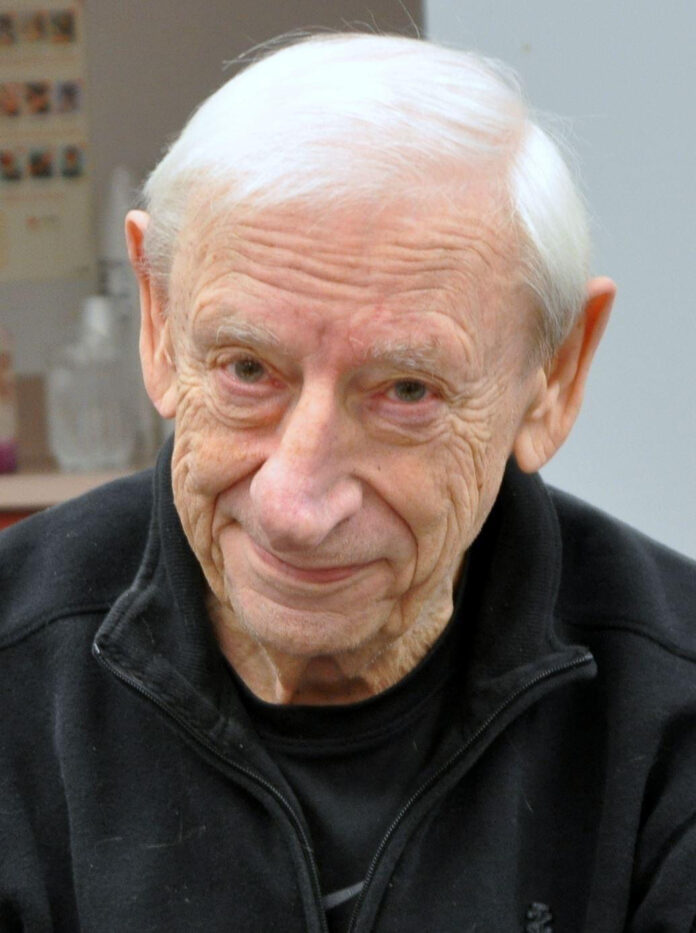On Veterans Day and shortly following the anniversary of Kristallnacht Fred Heyman, a Holocaust survivor who also served in the Korean War, came to speak at the Leffel Center for Jewish Student Life. After being introduced by Amanda Bloom ‘23, Heyman shared a 40 minute documentary, produced by Howard Goldberg, about his life. Heyman then answered questions about the film and gave advice to college students in attendance.
Heyman was born in 1929 in Berlin, Germany. However, a few years into his life, everything changed. In 1933, Hitler took power and his anti-Semitic policies started being implemented. Heyman remembers hearing Hitler’s victory speech on the radio.
One night, the Gestapo came to his house looking for him. His mother sent him to bed, telling him to look sick, in hopes that it would deter the Nazis from taking him. It didn’t stop the Gestapo from coming up to Heyman’s room. One of the officers felt his forehead and it was obvious that he was not sick. Yet, instead of taking Heyman, the officer said that they “could not use a sick Jew” and left the house. That memory has a lasting impact on Heyman. If his supervisors had found out he had let a Jewish child go, the officer could have been killed; in saving Heyman’s life, he was risking his own. Heyman emphasized that one moment of upstanding can change a life.
Heyman has encouraged many to become upstanders, sharing his harrowing story as a Holocaust survivor to show what happens when people idly stand by in the midst of hate. One of the ways that he has inspired others is through the program Twin with a Survivor. In the program, Jewish children who are soon to have a bar or bat mitzvah are paired with a Holocaust survivor to build connections and family. It is a chance for young Jewish people to learn from the few Holocaust survivors that are left. Not only do they impart religious guidance, but general life-lessons as well. For Heyman, it is special because his own children and grandchildren live far away from him. His favorite part of twinning is “putting myself mentally into the shoes of those twins.”
The connections that Heyman forms with Twin with a Survivor participants have profound impacts on them. One twin, when asked about Heyman, said that “[he] is my twin, one of my best friends and my fifth grandparent.” Another girl said, “[Heyman] gave me a passion for justice.” Even after they graduate from the program, the bond formed between Heyman and the kids that he mentors remains strong and intact.
“Fred Heyman is extremely important to my family and I,” said Bloom, the student organizer of the event. “For my sister’s bat mitzvah we all ‘twinned’ with Fred and got to hear his life story. I wanted to bring Fred to Muhlenberg so that he could see why Muhlenberg is such a special place… There are not many Holocaust survivors left. Therefore, it’s important we listen to the stories of the ones we have left; Fred is so important to me and I wanted to give him the opportunity to share his story with the Muhlenberg community.”
Heyman ended his presentation with a challenge for Muhlenberg students. “I beg all of you, starting today, to be upstanders,” he said. “By being an upstander, you’re making the world better and you’re making your life better… It was because of others being a bystander that I became an upstander.”
“I wanted to bring Fred to Muhlenberg so that he could see why Muhlenberg is such a special place… There are not many Holocaust survivors left. Therefore, it’s important we listen to the stories of the ones we have left”
How can one become an upstander? According to Heyman, being an upstander starts with eliminating hate. “You cannot use that word, it is the opposite of love. For 12 years, I had that h-word used against me… using that word leads to bullying in school, it leads to crime, and it ultimately lead to the Holocaust.”
Heyman’s talk was well received by students. Will Kalmanoff ‘24 said, “I learned a lot and gained a bigger perspective of what happened during the Holocaust.”
Isaac Shulman ‘25 also liked the event, saying that “it was really impactful when he talked about not using the word hate and thinking about it as really a decisive construct that separates people.”
“it was really impactful when he talked about not using the word hate and thinking about it as really a decisive construct that separates people.”
Ira Blum, Hillel director, added, “Every year there are fewer Holocaust survivors in our midst, and it is so important that we listen to, honor and remember their memories, stories and lessons. This is especially true with our responsibility as allies and upstanders in the face of injustice. This is one of the ways that we are living right now through a transitional moment in Jewish life.”
Matthew '24 is a philosophy and political thought major on the pre-law track.






















